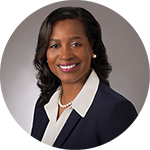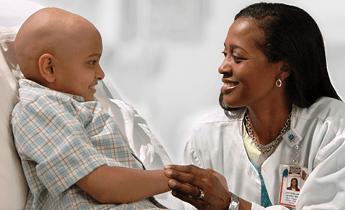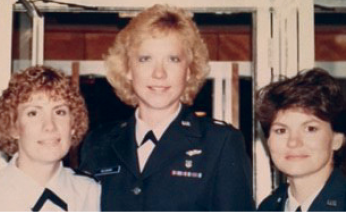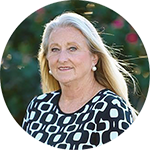Jackie Ward
A Lifelong Calling

Seven-year-old Jackie Ward listened intently at the dinner table, mesmerized as her mother recounted her day as a clinic coordinator at Texas Children’s Hospital in Houston. Captivated by stories of the organization’s people-centric culture, young Ward became convinced she wanted to follow in her mother’s footsteps as a health care provider.
Her childhood ambition only strengthened over the years. Nursing, with its winning combination of art and science in a nurturing role, checked all of Ward’s boxes. By 1993, her decades-long dream was finally realized when she proudly became a second-generation Texas Children’s employee as a student nurse. Even though, “I always tell people that I really started here when I was seven,” Ward laughs.
Driven by her fervor to provide compassionate, quality patient care, Ward kept her nose to the grindstone, gradually accepting advancement opportunities over the last 27 years at Texas Children’s. During her tenure, she’s held numerous clinical and managerial roles across a myriad of health care disciplines.
In recent years, Ward pivoted from clinical leadership to more formal senior leadership roles in hospital administration. Her hard work culminated on Jan. 1, 2021 as she began her newest assignment as Texas Children’s chief nursing officer. A wife and mother herself, Ward gives credit to her own mother for instilling her core values and forging a path for continued legacy. “I’m indebted to my mother and Texas Children’s because without her employment, I wouldn’t have been afforded the opportunity and education I have today,” said Ward. “When I walk the halls of Texas Children’s, I am walking in my mother’s footsteps.”
A Renewed Perspective
In many ways, Ward’s oncology nursing background forever changed her outlook on life, both personally and professionally.
“Cancer is a tough specialty and certainly not for the faint of heart,” Ward said. “You have to know where your stance is with your emotions and spirituality because death and dying are part of the job.”

“You must maintain a bedside connection in order to make an impact at the leadership leve. It doesn’t work to just imagine the work and challenges on the floor. I need to know firsthand how current policies impact my staff and patient care.”
While Ward encountered many unfathomably difficult moments in her career, speaking with a family after their loved one transitioned helped restore Ward’s perspective and purpose. “The feedback from these families reminded me to focus on what I’m giving back to others. They made me realize that I make an impact at the bedside, and that encouraged me to contemplate what I could do to make a broader impact. That’s when I knew I could do that at a leadership level,” Ward said.
Serving Patients and Providers
Today, Ward’s leadership is shaped by her clinical expertise and determination to remain closely connected to the frontline. “You must maintain a bedside connection in order to make an impact at the leadership level,” Ward said. “It doesn’t work to just imagine the work and challenges on the floor. I need to know firsthand how current policies impact my staff and patient care.”
Echoing the Robert Wood Johnson report on the Future of Nursing, Ward believes nursing is the critical discipline to transforming health care of the future. That’s why she chooses to focus on strategic priorities that are valuable to her frontline staffers, such as retention, recognition and wellness. “When I have happy and engaged staffers, they can deliver the advanced care our patients and community have come to expect,” Ward said.
To foster an environment that is rich in engagement, Ward makes it a point to empower her staff by giving them a voice in the decisions that impact their work. Ward established a forum for two-way communication between senior leadership executives and Texas Children’s patient care managers. In this symposium, frontline leaders have an opportunity to hear directly from executive leaders like Ward discussing topics they care about most. “I have had frontline leaders call me and say what you shared in our forum allowed me to come back to work with a new example of how to lead my team,” said Ward.
Mitzi Ressmann
A True Team Player

Before she was the Texas Hospital Association’s chief operating officer, Ressmann served as a nurse across many industries and disciplines. After graduating from the University of Texas at Austin with her nursing degree, Mitzi Ressmann enlisted with the United States Air Force for six years. As a first lieutenant, Ressmann learned what it meant to be resilient on the job, especially working for several years at a 1,200-bed teaching hospital. “As a young professional in the military, you develop leadership skills on the fly based on what works and doesn’t work when you’re managing people in the patient care environment,” Ressmann said.
It was during these grueling 12 hour shifts that Ressmann earned her stripes, figuring out how to get the job done well with limited resources. In addition to patient care, Ressmann’s responsibilities included training first year medical residents and completing various trainings of her own in crisis management, survival in field and triage.
Three years into her time with the Air Force, Ressmann showed incredible bravery in the face of personal tragedy. Her mother, based nearby, was diagnosed with cancer. As a result, Ressmann was permitted to stay put at the teaching hospital instead of moving on to a different rotation, as she may have otherwise done. To cope with the stressors of the job and her own grief as her mother neared the end of her life, Ressmann turned to athletics to keep her mind and body healthy.
“When we were working non-stop, I made it a point to prioritize self-care to relieve stress and take care of myself,” Ressmann said. “Sports are an excellent outlet when you’re going through personal or professional struggles. You have to train your mind to focus on what’s right in front of you.”
That focus set Ressmann up for a lifetime of success on the field and at work. After completing her role with the Air Force, she worked for a large insurance provider managing nurses throughout mid and south United States before moving on to manage education compliance, quality and staff development for several home health companies. An opportunity to help open a hospital start-up brought Ressmann back to Austin, and 20 years ago she joined THA.

“Nurses are utility players, primed for this type of role. We have to be facilitators, motivators, problem solvers, coaches, coordinators and more. When everyone else has given up, that’s when nurses really shine.”
“Throughout my career I have been very fortunate to have role models and people who afforded me a variety of opportunities. Every role along the way has kept me engaged and acquiring new skills, all of which translated from one role to the next,” Ressmann said.
Effective Leaders are Utility Players
A lifetime problem-solver, Ressmann’s critical thinking skills and persistence have paid dividends in her career. More than anything, she values willingness to seek solutions no matter what. “In baseball, utility players fill various positions when necessary and bring value to the team,” Ressmann said. “Nurses are utility players, primed for this type of role. We have to be facilitators, motivators, problem solvers, coaches, coordinators and more. When everyone else has given up, that’s when nurses really shine.”
As chief operating officer, Ressmann acknowledges that her direct knowledge of patient care gives her a different perspective when making decisions that impact diverse populations. “Working with patients in the hospital and in their home adds an additional layer of perspective,” Ressmann said. “That needs to be factored in when making decisions about people’s lives. It’s important to bring the patient’s voice to the table when discussing public health care policy.”
While Ressmann is proud of the major national projects she’s led over time, she’s more concerned with the small impacts she makes on a daily basis. “If I can make a difference in one employee or patient’s life today, then I’ve done a good job. If I can do that, the organizational change happens over time,” Ressmann said. For this reason, Ressmann dedicates time to mentor upcoming leaders, providing advice where she can and pushing them to see the potential in themselves.
“At the end of the day, I’m energized by watching someone else grow and reach their full potential,” Ressmann said.
Kathy Boswell
A Heart Made for Service

Kathy Boswell is a lifelong nurse with a heart for serving others. For Boswell, the characteristics required for nurses and leaders are synonymous. “In both roles, you’ve got to be the kind of person that wants to make a difference and serve others. Leadership is not about me and what looks shiny on my wall. It’s what I can do for my fellow man, patients and community,” Boswell said. “That’s pretty much what a nurse is made up of anyway if they’re worth their salt.”
If anyone would know, it’s Boswell, who has served in clinical and education-based leadership roles across North Texas for the last 40 years. In the early 70’s, Boswell left her hometown of Mineral Wells to pursue a nursing degree at Texas Women’s University. Following graduation, her grit, determination and zest for learning set her up for success in a wide range of roles in her early career; from her position as the first charge nurse in the obstetrics intensive care unit at Parkland Health and Hospital System in Dallas, to a critical care nurse at an eight-bed hospital in Throckmorton.
Educating Tomorrow’s Workforce
Eventually, Boswell returned home to Mineral Wells, joining the ICU at Palo Pinto General Hospital. When offered an opportunity to develop a vocational nursing program for Weatherford College, she jumped at the chance. Within five years she was the program’s director and today she is the dean of Weatherford College’s Human and Health Science department. “Developing new health care programs for Weatherford College is the greatest job in the world,” Boswell said. “I’m really excited to work with a new generation of health care providers as they come to us from hospital and clinical settings and transition into an educator role.”

“In both roles, you’ve got to be the kind of person that wants to make a difference and serve others. Leadership is not about me and what looks shiny on my wall. It’s what I can do for my fellow man, patients and community.”
For the last two decades, Boswell has methodologically created new programs for Weatherford College, proposing new ideas to her board as soon as she discovers a need in the industry. In addition to conducting research, assessing needs at both the local and state levels, and staying connected with students and preceptors in the clinical setting, Boswell oversees nine programs, with more brewing in the pipeline.
Though she stepped away from bedside nursing, Boswell knew she could add value to the Palo Pinto General Hospital board from the patient care and nursing perspective. Following her intuition, Boswell ran for election and earned a spot on the hospital’s board, a position she’s held for the last 26 years. In addition to her day job and hospital board responsibilities, Boswell volunteers with the Parks and Recreation Board and the Mineral Wells community pool. For the last 57 summers she’s been a community fixture at the pool as a certified Red Cross instructor and trainer. Thanks to the support of her family, Boswell has managed to do it all with her husband of 40 years and three grown children by her side.
The grit and determination that served Boswell in her clinical roles stays with her to this day. If something needs to get done, Boswell will get it done. “Oftentimes if I’m on campus at night and a faculty member is looking for supplies, I go hunting,” Boswell said. While leadership was not necessarily the ultimate goal, her service mentality made Boswell a natural fit for leadership roles. “In order to be a leader, you have to be a servant leader. You have to be willing to roll up your sleeves, go where you’re needed, and help those people that call on you.”
Homegrown Talent in Mineral Wells
Investing in local talent is one of Boswell’s top priorities and greatest sources of job satisfaction. “Every student that finishes at Weatherford College is a success story for me,” Boswell said.
While she celebrates every student, she has a particular soft spot for those who obtain an education and enter the workforce despite being down on their luck. From homeless students to single, struggling mothers, Boswell is in awe of what these courageous people can achieve. In particular, Boswell recalls one student who made incredible sacrifices to seek her degree, including temporarily putting her children in a group home. Ultimately, she finished the program, reunited with her children full-time, and went on to receive her associate’s, bachelor’s, master’s and eventually doctorate degrees. “It’s her success, but those are the stories that make all of this worthwhile,” Boswell said.
Next, Boswell has her sights set on bringing a bachelor’s program to Weatherford College. “I’m very grateful for the opportunities that people entrust with me, and I never forget that,” Boswell said.
